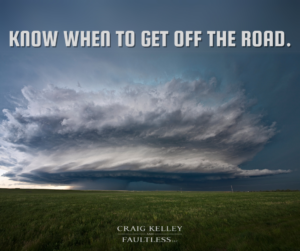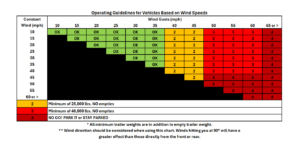
Tornadoes, thunderstorms and extreme winds wreaked havoc on Midwestern states this May, including Indiana and Missouri. On May 16 alone, there were 22 confirmed tornadoes in the U.S.
For folks on the roadways, extreme weather is more dangerous. Perhaps the most affected are commercial truck drivers, some of whom spend 11 hours per day on the road.
If truckers make the wrong decisions while driving in bad weather, they can cause horrible wrecks. What happens if truckers drive in high winds? How should they respond to extreme weather?
Find out below.
It’s Tornado Season in the United States
May has seen about 236 tornadoes (as of 5/28/2025), with 28 of them occurring on May 16.
The worst of these — categorized as an EF4, the second-highest rating on the Enhanced Fujita scale — devastated Williamson, Illinois. Winds reached 190 miles per hour, the National Weather Service reported.
Other destructive tornadoes in the Midwest that day included category EF3 storms in St. Louis, MO; Stoddard and Scott Counties, MO; and Union County, KY. At least seven people and 19 people were killed by tornadoes in Missouri and Kentucky, respectively.
How High Winds Impact Vehicles and Road Safety
At wind speeds of only 65-85 mph, billboards and large signs can be knocked down. At 86-110 mph, cars and other vehicles may be pushed off the road or flipped, and at 111-135 mph, vehicles can be lifted off the ground.
To put this into perspective, one Illinois tornado on May 16, 2025, had winds up to 190 mph — enough to push over, flip, or pick up trains and large trucks, or hurl passenger cars across far distances.
While extreme damage occurs with tornado-speed winds, even strong gusts from thunderstorms can be destructive. A 60-mph gust of wind can flip a semi tractor-trailer on its side.
Semi-Truck Rollovers Triggered by Wind Gusts
Semi-trucks hauling trailers are perfect targets for gusts of wind. Their tall, wide sides are like billboards, shoved back and forth by strong winds. Sometimes, this flips the vehicle on its side — a type of wreck known as “rollover.”
Speeding, turning too quickly, or failing to assess road conditions can also cause rollover wrecks.
One day in early April, five semi tractor-trailers heading northbound on Interstate 65 in Indiana flipped over because of intense wind. Thunderstorms were moving through the area, and gusts of wind were reportedly as high as 50 mph.
Semi-trucks that flip over can crash into nearby passenger vehicles, spill their loads into the roadway, or block lanes of traffic until the mess is cleared.
Though extreme weather can hit an area unexpectedly, there are regulations in place to keep truck drivers safe amid poor conditions.
Safety Tips for Truck Drivers in High Wind Conditions
The Department of Transportation’s FMCSA (Federal Motor Carrier Safety Administration) governs heavy trucks and other commercial vehicles. It sets rules and regulations for truck drivers to follow.
Here is what it says about hazardous weather conditions:
Extreme caution must be exercised when hazardous weather conditions adversely affect visibility or traction as it relates to a motor vehicle. Drivers are required to reduce speed under such conditions. If conditions become sufficiently dangerous, operations must immediately be discontinued until the vehicle can again be safely operated. In a case where the danger to the driver, occupants, or other users on the road would increase by stopping, the driver may continue operating the vehicle until the nearest place the danger can be eliminated.
Bad weather, including high wind, is considered an “extreme driving condition” by FMCSA and thus must be addressed with extreme caution.
On Trucking Truth, an online resource and conversation forum for commercial truckers, one user shared a helpful chart from his driver portal:

As the chart above shows, trucks that aren’t hauling much weight or trucks with empty trailers are much more vulnerable to high winds. They are more likely to tip over if a strong gust of wind catches the trailer.
It is also important that the cargo a semi is hauling is properly loaded and secured. The weight should be distributed evenly throughout the trailer. If anything on or in the commercial motor vehicle is flapping in the wind or sliding around, it throws off the truck’s balance and creates a jackknife or rollover risk.
How Passenger Vehicle Drivers Can Stay Safe in Windy Storms
All drivers should know how to react in extreme weather conditions. If you live in Indiana or another Midwestern state, you know that storms aren’t always predictable. Sometimes, dark clouds roll in, and you’re hit with heavy rain and wind seemingly out of nowhere — especially during late spring and summer.
Here are a few tips for drivers of passenger vehicles who find themselves on the road during a storm.
- If a tornado is in the area, take the nearest exit away from the tornado’s path and toward shelter. If you must pull over, try to get below the level of the roadway, like in a ditch.
- If hail is falling, pull off the roadway and seek shelter in a garage or under an awning. Try to cover yourself to protect against broken glass or debris.
- Remember the mantra, “Turn Around. Don’t Drown.” If the road is flooded, turn around and find another route. If there is only a bit of water on the road, you may be safe to keep driving — but turn, accelerate and brake gently to avoid hydroplaning.
- In bad weather, always use your headlights. This can help you see and alert other motorists to your presence. If you pull onto the side of the road, use your hazard flashers.
- Always check the radar/forecast before you hit the road. Though storms can be unexpected, this is the best way to be prepared for adverse weather conditions.
- Keep both hands on the wheel at all times. If strong gusts are pushing your car, steer toward the wind.
- In strong winds, stay far away from semi tractor-trailers and other large trucks. If they swerve or topple, you’ll want to be a safe distance from them.
Steps to Take After a Semi-Truck Accident in Bad Weather
Unfortunately, weather is one of several contributing factors in heavy-truck wrecks. When the drivers of 18-wheelers are drowsy, distracted, or impaired, they can cause wrecks. If they speed, turn too quickly, change lanes without checking their blind spots, or tailgate passenger cars, they can severely injure or kill people.
When storms roll in and rain and wind intensify, driver error becomes significantly more dangerous. A reckless truck driver plus bad weather is a deadly combination.
If you have been injured or if you have lost a loved one in a crash caused by a negligent semi-truck driver, you must act quickly. Speak with an experienced truck accident lawyer as soon as possible.
Why You Need a Truck Accident Lawyer After a Weather-Related Crash
Attorneys who center their practice around commercial motor vehicle wrecks know what it takes to fight insurance companies and negligent motor carriers. The lawyers at Craig, Kelley & Faultless are prepared to represent you and secure financial compensation for your injuries.
Contact us today at (800) 746-0226 or with our online form.
David W. Craig is a nationally recognized truck accident lawyer who sits on the Board of Regents of the Academy of Truck Accident Attorneys. He is board certified in Truck Accident Law. He is the managing partner and one of the founding partners of Craig, Kelley & Faultless LLC. He is recognized as a Top 10 Trucking Trial Lawyer and Top 100 Trial Lawyer in Indiana by the National Trial Lawyers, as well as a Top 50 Indiana lawyer by Super Lawyers. He was the recipient of the National Thurgood Marshall “Fighting for Justice” Award for his work helping victims of truck wrecks. David is the author of Semitruck Wreck, A Guide for Victims and Their Families, written to help people navigate a terrible situation by answering questions that come after a tragic wreck. He also hosts the podcast After the Crash, where you can gain valuable information about the dangers involving semis and large trucks that do not follow Indiana law safety protocol regarding speed, weather conditions, maintenance upkeep, etc.



 Email
Email Facebook
Facebook Twitter
Twitter